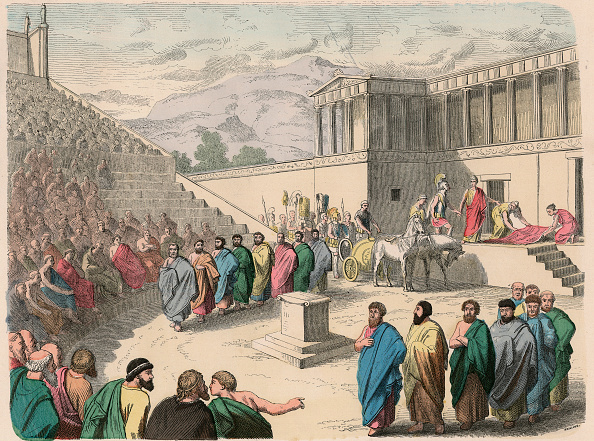Linking religion with psychology: the nature of the tragic theatre

TRAGEDY
What made Greek tragedy so special was the harmonious combination of primitive sentimentality and rational thought, two states that rarely get along. The primitive emotion was expressed in the worship of the god Dionysus, a lively and unruly god who loves wine, dancing and love, while disliking all restraint. Logic and moderation characterize Apollo, the god of light, music and harmony.
Although brought into being by Dionysian rites, theatre gradually expanded into Apollo’s realm, in the same way that the human brain first developed the part that processes emotion and later acquired the tools of logical processing. Today we know that these two parts of the brain perform different functions, with the result that we often act irrationally, following the commands of the thymic,before any logical restraint can process the command.
What may happen in our life is that what we feel from an experience (joy, pain, fear, etc.) is stored in a special part of the brain. If we don’t release it from there so that it can be processed logically, it remains repressed in the dark closet of emotion and from there it guides, without our knowledge, our decisions in the future. Through the filter of emotions triggered by our experiences we see everything that happens in our lives, evaluate it and form an opinion about it. In short, we cannot have an objective view of reality, but each of us interprets it through our own “lens”, in the blur formed by the intensity of our emotions, especially the negative ones. It is this blurred vision that experiencing a tragedy can clear.
Tragedy is performed by acting and dance. Actors perform a role, but in metre, as poets recite their poems. Members of the chorus sing songs (which became the hits of the time) while making rhythmic, dance-like movements. The rhythm and melody created the right atmosphere, caused the necessary reactions that stirred the inner world of the spectator, who thus was pulled into the action, identifying with the suffering hero.
The words of the dialogues and songs are reasonably clear, understandable to the viewer as much as Shakespearean dialogue was to his contemporary audience, very carefully worded and aimed at revealing the reasons that lead the hero to do what he does. From two sources his decisions emerge at pace: from the way he thinks and from his ethos, i.e. his character. Logic and emotion. Apollo and Dionysus!
Tragedies were written according to a specific plan. The structure of the play was such that it very carefully escalated the emotions of the spectator. This approach remains almost the same in modern films, especially those dealing with social or emotional issues. As a result, the viewer experiences step by step the crushing of the hero, who sees his once happy life heading towards destruction. This deterioration is sometimes due to the consequences of mistakes he has made voluntarily or unintentionally in the past, and sometimes to chance occurrences or, if you prefer, divine actions. In either case, the viewer suffers along with the hero, pulling out of his own dark closet his own forgotten failures and misfortunes. Together with the hero, he relives the pain he struggled to forget. Sometimes the tension was so great that the audience could not bear it. This was the case with a play that unfortunately has not survived, the “Fall of Miletus” by the poet Phrynichus. The Athenians could not handle the grief it caused them – because it made them relive the enslavement of their related city, Miletus. They not only banned the performance of the play, but punished the poet with a heavy fine. The audience reacted so excessively because the incident was very recent and because they were extremely sensitive to patriotic issues.
PSYCHOTHERAPY
Fear and pity are the fundamental emotions that tragedy evokes, forcing the spectator to relive anexperience buried in the depths of his mind and to face it by expressing his pain. Alone, he would not dare to uncover the dark part of his soul for fear of appearing weak. But there in the theatre, he shares his experience with other people who are each experiencing their own drama. Like a silent psychotherapy.
Consider the moment when young Iphigenia arrives at the port of Aulis, excited to marry Greece’s greatest hero, the beautiful Achilles. This is what her father, King Agamemnon, had promised her when he invited her to come. But instead of Achilles, death awaited her. She had to be sacrificed to Artemis to obtain a favourable wind that would drive the Achaean ships to Troy. What a betrayal! What an evil game of fate! What a ruthless father! Just before the priest’s knife descends on her neck, however, the goddess Artemis puts a stag in its place, and she is taken away to a foreign land, a priestess in her temple. She is spared the worst, but in tragedy there is no happy ending, like the one we see in Hollywood movies. In tragedy, the viewer is trained to accept reality, to empower their soul, not just to vent but bury more misery in their subconscious. The viewer will accept that the betrayed Iphigenia will be spared death, but will be forced to serve forever as a priestess to the goddess who saved her.
When the play ends. The audience of the ancient theatre often knew the basic plot-line of the play before they saw it. They had probably seen thestory before or had been told the same story by their grandparents. Today it may seem boring to us, but when the purpose is to teach and not to entertain, it makes sense. Don’t we tell our psychotherapist the same thing over and over again? But that’s the purpose: to familiarize ourselves with our hidden thoughts. Modern psychotherapy does not promise miracles. If you enter into this process, you will most likely continue it forever. This is because the grief and fear we have accumulated is due to many complex life events, and our tolerance for the process of uncovering the sources of pain is limited. In Ancient Greece, the catharsis of the soul occurred not only in the theatre, but also in various other religious events of a dramatic form, such as processions and torchlight processions. Today, you would be very lucky to get a good feel of whatancient tragedy was about. If you find yourself in Epidaurus in the summer, try your luck. But until then, you can read some of the plays and become the director yourself. Engage your imagination and try the first psychotherapeutic method invented by the human mind in Europe. It will cost you as much as a book.


